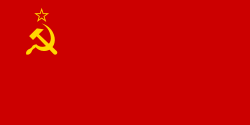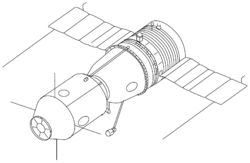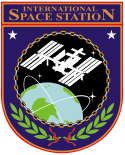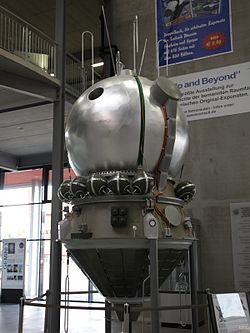Sojuz MS-04
| Sojuz MS-04 (Союз МС-04) | |||
| Beställare | Roskosmos | ||
|---|---|---|---|
| Modell | Sojuz-MS | ||
| Tillverkare | RKK Energia | ||
| Operatör | Roskosmos | ||
| Färdens tid | 136 dag | ||
| NSSDC-ID | 2017-020A[1] | ||
| Uppskjutning | |||
| Startplats | Bajkonur 1/5 | ||
| Start | 20 april 2017, 07:13:44 UTC | ||
| Raket | Sojuz-FG | ||
| Landning | |||
| Landningsplats | Kazakstan | ||
| Landning | 3 september 2017, 01:22 UTC | ||
| Omloppsbana | |||
| Banlutning | 51,6° | ||
| Besättning | |||
| Start | Fjodor Jurtjichin Jack D. Fischer | ||
| Landning | Fjodor Jurtjichin Jack D. Fischer Peggy Whitson | ||
 V-H: Jurtjichin och Fischer | |||
| Dockning | |||
| Rymdstation | ISS | ||
| Dockning | 20 april 2017, 13:18 UTC | ||
| Port | Pojsk, zenit | ||
| Ur dockning | 2 september 2017, 21:58 UTC | ||
| Tid dockad | 135 dag | ||
| Kronologi | |||
| |||
Sojuz MS-04 (ryska: Союз МС-04) var en flygning i det ryska rymdprogrammet, till Internationella rymdstationen. Farkosten sköts upp med en Sojuz-FG-raket, från Kosmodromen i Bajkonur den 20 april 2017. Farkosten dockade med rymdstationen några timmar efter uppskjutningen.
Flygningen transporterade Fjodor Jurtjichin och Jack D. Fischer som var del av Expedition 51 och 52 till och från rymdstationen.
Peggy Whitson var även med ombord när farkosten lämnade rymdstationen, återinträdde i jordens atmosfär och landade i Kazakstan den 2 september 2017.
Besättning
| Uppskjutning | Landning | |
|---|---|---|
| Befälhavare | Hans femte rymdfärd Expedition 51 / 52 | |
| Flygingenjör 1 | Hans första rymdfärd Expedition 51 / 52 | |
| Flygingenjör 2 | plats tom | Hennes tredje rymdfärd Expedition 50 / 51 / 52 |
Reservbesättning
| Befälhavare | |
|---|---|
| Flygingenjör 1 |
Referenser
- Den här artikeln är helt eller delvis baserad på material från engelskspråkiga Wikipedia, Soyuz MS-04 tidigare version.
Noter
- ^ ”NASA Space Science Data Coordinated Archive” (på engelska). NASA. https://nssdc.gsfc.nasa.gov/nmc/spacecraft/display.action?id=2017-020A. Läst 28 februari 2020.
| |||||||||||||||||||||||||||||||||||||||||||||||||||||||||||||||||||||||||||||||||||||||||
| |||||||||||||||||||||||||||||||
| ||||||||||||||||||||||||||||||||
Media som används på denna webbplats
Soyuz-A manned spacecraft concept (1963). It was to have been part of the Soyuz A-B-C circumlunar complex.
Apollo-Soyuz Test Project (ASTP) Soyuz. The APAS-75 docking unit is located at left.
Soyuz-TM spacecraft. Compare the antennas on the orbital module to those on Soyuz-T. Differences reflect the change from the Igla rendezvous system used on Soyuz-T to the Kurs rendezvous system used on Soyuz-TM.
The Soyuz TMA-04M spacecraft is seen after being rolled out by train to the launch pad at the Baikonur Cosmodrome in Kazakhstan, May 13, 2012. The launch of the Soyuz spacecraft, with Expedition 31 Soyuz Commander Gennady Padalka, Flight Engineer Sergei Revin of Russia and NASA Flight Engineer Joe Acaba, is scheduled for 9:01 a.m., May 15 (Kazakhstan time).
Rotated and color enhanced version of original (ISS013-E-48788 (6 July 2006) --- The Space Shuttle Discovery approaches the International Space Station for docking but before the link-up occurred, the orbiter went through a series of inspection photos by station crew to inspect the vehicle for any damage to its Thermal Protection System. This was known as the Rendezvous Pitch Maneuver and was implemented after the Columbia Disaster in 2003. The Leonardo Multipurpose Logistics Module can be seen in the shuttle's cargo bay. Discovery docked at the station's Pressurized Mating Adapter 2 at 9:52 a.m. CDT, July 6, 2006.)
Backdropped by a blue and white Earth, this close-up view features the Soyuz TMA-6 spacecraft approaching the International Space Station (ISS). Onboard the spacecraft are cosmonaut Sergei K. Krikalev, Expedition 11 commander representing Russia's Federal Space Agency; astronaut John L. Phillips, NASA ISS science officer and flight engineer; and European Space Agency (ESA) astronaut Roberto Vittori of Italy. The Soyuz linked to the Pirs Docking Compartment at 9:20 p.m. (CDT) on April 16, 2005 as the two spacecraft flew over eastern Asia. The docking followed Friday’s launch from the Baikonur Cosmodrome in Kazakhstan.
In this illustration, a SpaceX Crew Dragon spacecraft approaches the International Space Station for docking. NASA is partnering with Boeing and SpaceX to build a new generation of human-rated spacecraft capable of taking astronauts to the station and expanding research opportunities in orbit. SpaceX's upcoming Demo-1 flight test is part of NASA’s Commercial Crew Transportation Capability contract with the goal of returning human spaceflight launch capabilities to the United States.
Författare/Upphovsman: Pascal (Flickr user: pasukaru76), Licens: CC0
Vostok spacecraft replica at the Technik Museum Speyer, Germany.
In the Integration Building at the Baikonur Cosmodrome in Kazakhstan, Expedition 51 crewmembers Fyodor Yurchikhin of the Russian Federal Space Agency (Roscosmos, left) and Jack Fischer of NASA (right) pose for pictures April 6 in front of their Soyuz MS-04 spacecraft as part of pre-launch training preparations. Fischer and Yurchikhin will launch April 20 on the Soyuz MS-04 spacecraft for a four and a half month mission on the International Space Station.


















